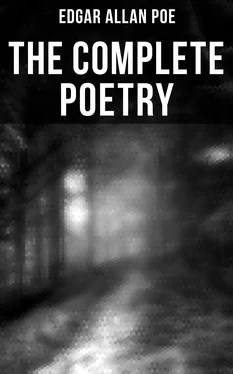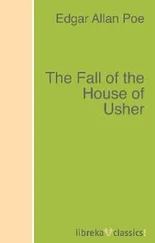VI.
'Tis not to thee that I should name—
Thou canst not—wouldst not dare to think
The magic empire of a flame
Which even upon this perilous brink
Hath fix'd my soul, tho' unforgiven,
By what it lost for passion—Heaven.
I loved—and O, how tenderly!
Yes! she [was] worthy of all love!
Such as in infancy was mine,
Tho' then its passion could not be: 'Twas such as angel minds above Might envy—her young heart the shrine On which my every hope and thought Were incense—then a goodly gift— For they were childish, without sin, Pure as her young example taught; Why did I leave it and adrift, Trust to the fickle star within?
VII.
We grew in age and love together,
Roaming the forest and the wild;
My breast her shield in wintry weather,
And when the friendly sunshine smiled
And she would mark the opening skies,
I saw no Heaven but in her eyes—
Even childhood knows the human heart;
For when, in sunshine and in smiles,
From all our little cares apart,
Laughing at her half silly wiles,
I'd throw me on her throbbing breast,
And pour my spirit out in tears,
She'd look up in my wilder'd eye—
There was no need to speak the rest—
No need to quiet her kind fears—
She did not ask the reason why.
The hallow'd memory of those years
Comes o'er me in these lonely hours,
And, with sweet loveliness, appears
As perfume of strange summer flowers;
Of flowers which we have known before
In infancy, which seen, recall
To mind—not flowers alone—but more,
Our earthly life, and love—and all.
VIII.
Yes! she was worthy of all love!
Even such as from the accursed time
My spirit with the tempest strove,
When on the mountain peak alone,
Ambition lent it a new tone,
And bade it first to dream of crime,
My frenzy to her bosom taught:
We still were young: no purer thought
Dwelt in a seraph's breast than thine ; For passionate love is still divine: I loved her as an angel might With ray of the all living light Which blazes upon Edis' shrine. It is not surely sin to name, With such as mine—that mystic flame, I had no being but in thee! The world with all its train of bright And happy beauty (for to me All was an undefined delight), The world—its joy—its share of pain Which I felt not—its bodied forms Of varied being, which contain The bodiless spirits of the storms, The sunshine, and the calm—the ideal And fleeting vanities of dreams, Fearfully beautiful! the real Nothings of mid-day waking life— Of an enchanted life, which seems, Now as I look back, the strife Of some ill demon, with a power Which left me in an evil hour, All that I felt, or saw, or thought, Crowding, confused became (With thine unearthly beauty fraught) Thou—and the nothing of a name.
IX.
The passionate spirit which hath known,
And deeply felt the silent tone
Of its own self supremacy,—
(I speak thus openly to thee,
'Twere folly now to veil a thought With which this aching breast is fraught) The soul which feels its innate right— The mystic empire and high power Given by the energetic might Of Genius, at its natal hour; Which knows (believe me at this time, When falsehood were a tenfold crime, There is a power in the high spirit To know the fate it will inherit) The soul, which knows such power, will still Find Pride the ruler of its will.
Yes! I was proud—and ye who know
The magic of that meaning word,
So oft perverted, will bestow
Your scorn, perhaps, when ye have heard
That the proud spirit had been broken,
The proud heart burst in agony
At one upbraiding word or token
Of her that heart's idolatry—
I was ambitious—have ye known
Its fiery passion?—ye have not—
A cottager, I mark'd a throne
Of half the world, as all my own,
And murmur'd at such lowly lot!
But it had pass'd me as a dream
Which, of light step, flies with the dew,
That kindling thought—did not the beam
Of Beauty, which did guide it through
The livelong summer day, oppress
My mind with double loveliness—
*****
X.
We walk'd together on the crown
Of a high mountain, which look'd down
Afar from its proud natural towers
Of rock and forest, on the hills—
The dwindled hills, whence amid bowers
Her own fair hand had rear'd around,
Gush'd shoutingly a thousand rills,
Which as it were, in fairy bound
Embraced two hamlets—those our own—
Peacefully happy—yet alone—
*****
I spoke to her of power and pride—
But mystically, in such guise,
That she might deem it nought beside
The moment's converse; in her eyes
I read (perhaps too carelessly)
A mingled feeling with my own;
The flush on her bright cheek, to me,
Seem'd to become a queenly throne
Too well, that I should let it be
A light in the dark wild, alone.
XI.
There—in that hour—a thought came o'er
My mind, it had not known before—
To leave her while we both were young,—
To follow my high fate among
The strife of nations, and redeem
The idle words, which, as a dream
Now sounded to her heedless ear—
I held no doubt—I knew no fear
Of peril in my wild career;
To gain an empire, and throw down
As nuptial dowry—a queen's crown,
The only feeling which possest,
With her own image, my fond breast—
Who, that had known the secret thought
Of a young peasant's bosom then,
Had deem'd him, in compassion, aught
But one, whom fantasy had led
Astray from reason—Among men
Ambition is chain'd down—nor fed
(As in the desert, where the grand,
The wild, the beautiful, conspire
With their own breath to fan its fire)
With thoughts such feeling can command;
Uncheck'd by sarcasm, and scorn
Of those, who hardly will conceive
That any should become "great," born
In their own sphere—will not believe
That they shall stoop in life to one
Whom daily they are wont to see
Familiarly—whom Fortune's sun
Hath ne'er shone dazzlingly upon,
Lowly—and of their own degree—
XII.
I pictured to my fancy's eye
Her silent, deep astonishment,
When, a few fleeting years gone by,
(For short the time my high hope lent
To its most desperate intent,)
She might recall in him, whom Fame
Had gilded with a conqueror's name,
(With glory—such as might inspire
Perforce, a passing thought of one,
Whom she had deemed in his own fire
Withered and blasted; who had gone
A traitor, violate of the truth
So plighted in his early youth,)
Her own Alexis, who should plight
The love he plighted then —again. And raise his infancy's delight. The bride and queen of Tamerlane.—
XIII.
One noon of a bright summer's day
I pass'd from out the matted bower
Where in a deep, still slumber lay
My Ada. In that peaceful hour,
A silent gaze was my farewell.
I had no other solace—then
To awake her, and a falsehood tell
Of a feign'd journey, were again
To trust the weakness of my heart
To her soft thrilling voice: To part
Thus, haply, while in sleep she dream'd
Of long delight, nor yet had deem'd
Awake, that I had held a thought
Of parting, were with madness fraught;
I knew not woman's heart, alas!
Читать дальше












